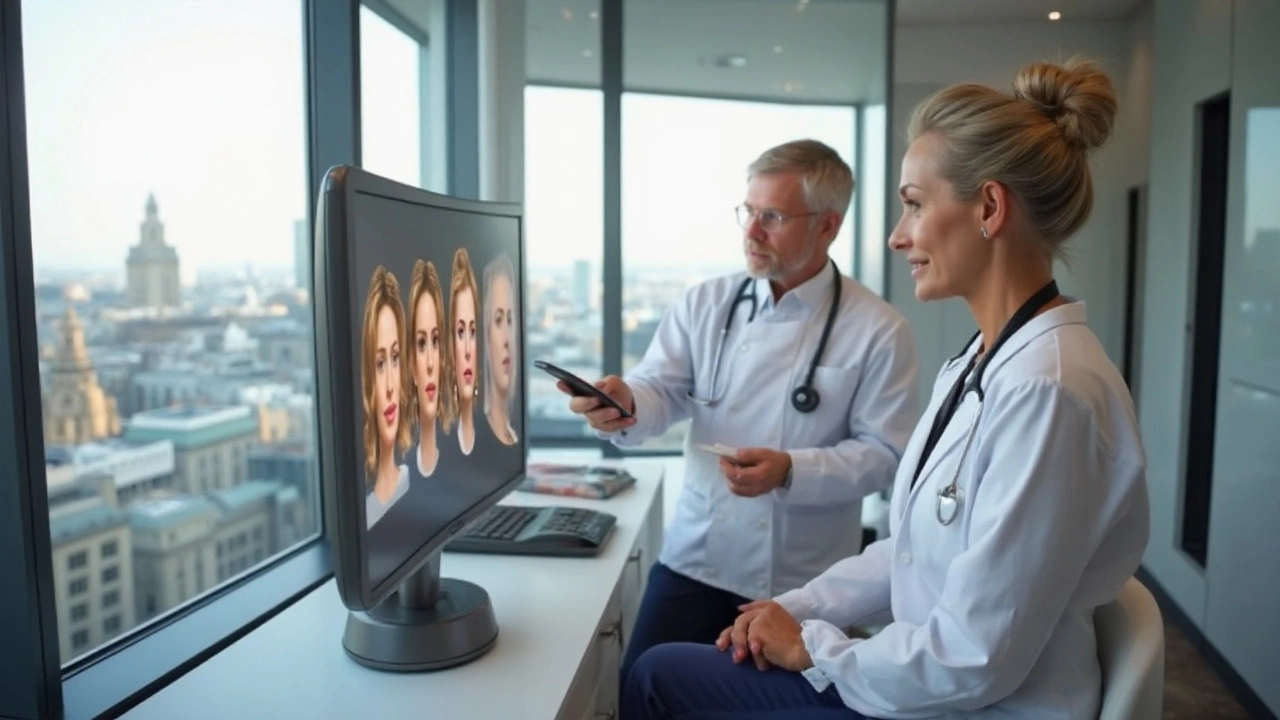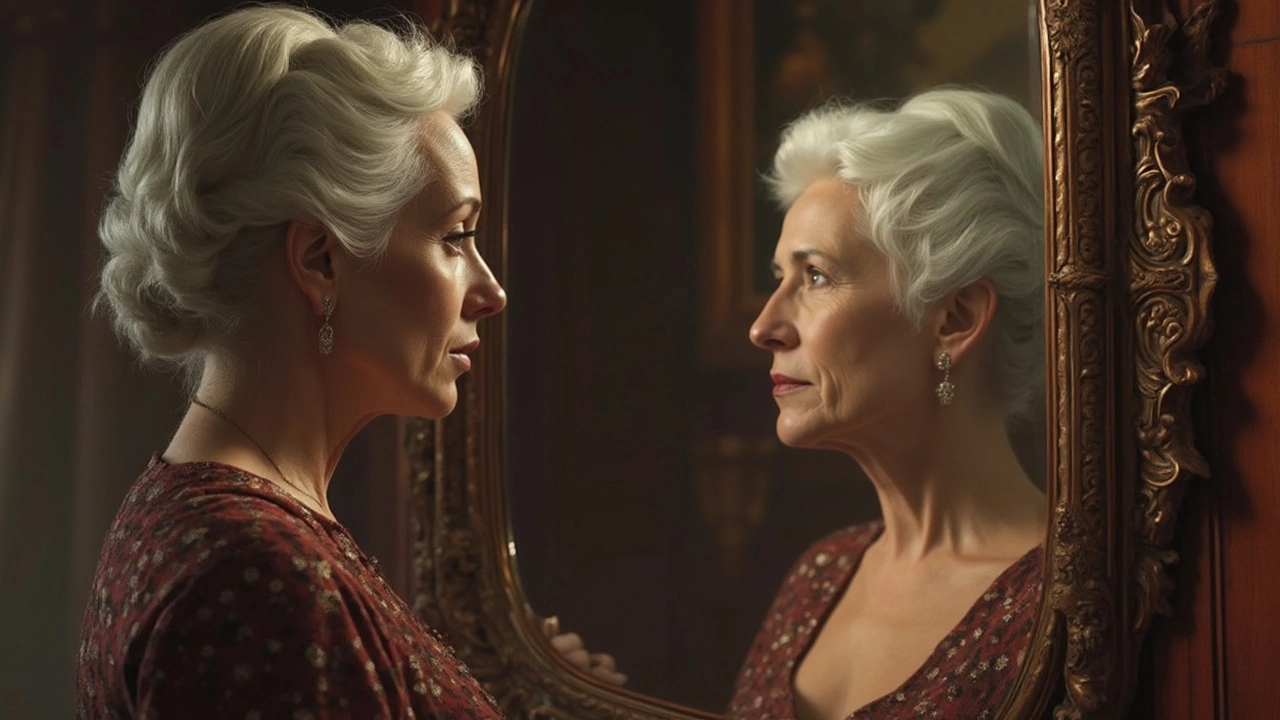Ever found yourself staring at the mirror, pondering if a facelift is still an option at your age? It's a common dilemma, but age might not be the dealbreaker you think it is. Many people in their 50s, 60s, or even 70s explore facelifts as a way to feel more confident and refreshed.
Surprisingly, the calendar doesn't dictate success as much as your overall health does. A fit 70-year-old could fare better than a less healthy 50-year-old. So, before circling a number on the age chart, let's focus on what really matters: your well-being.
Of course, there's the question of results. The skin's elasticity and healing capabilities do change over the years. But hey, modern techniques have come a long way, helping people achieve natural-looking transformations that match their personal goals.
- Facelift Basics and Age Myths
- Health Over Age
- What About Results?
- Safety Considerations
- Consultation Tips
Facelift Basics and Age Myths
When people hear the word facelift, they often envision a procedure exclusive to the rich and famous or think it's only suitable for those who are 'of a certain age.' Watch out—a lot of this is myth more than reality. So, what exactly is a facelift, and how does age come into play?
Understanding the Basics
A facelift, also known as a rhytidectomy, is a surgical procedure aimed at lifting and tightening the skin on the face to create a younger appearance. This might involve removing excess skin, tightening underlying tissues, and redraping the skin around the neck and face. Modern facelifts aren't just about pulling the skin tight; they focus on creating a natural look, using advanced techniques to ensure well-distributed tension.
Busting Age Myths
One of the biggest misconceptions is that the operation is only for those in their 40s or 50s. Guess what? There's no officially sanctioned 'cut-off' age. People well into their 70s and beyond undergo the procedure with impressive results. Age isn't the sole factor; your overall health status, skin condition, and goals take center stage.
Here's an interesting nugget: a study published in 2022 discovered that facelifts performed on patients between 65-70 had similar results and satisfaction rates as those done on younger individuals. So, forget the ticking clock!
Why Health Trumps Age
More important than age is how physically prepared you are for the surgery. Are you a non-smoker? Is your skin still elastic? These are the questions your surgeon will ask. If you're in good shape and your health is stable, chances are, you're a good candidate for the cosmetic surgery.
Setting Realistic Expectations
While the mirror might reflect more life experiences, don't expect a major age rewind. Instead, think about softening the features that may give away your years, like sagging jowls or loose neck skin. Surgeons emphasize subtle changes that keep you looking like you, just more refreshed.
Before you decide to go under the knife, consult a board-certified professional who can guide you toward realistic, safe, and satisfying results. All in all, the most crucial factor might just be waking up every day feeling content with your reflection.
Health Over Age
When it comes to deciding if you're too old for a facelift, your health trumps age. That's right, the number on your birth certificate isn't as crucial as the state of your health. Surgeons often assess potential candidates based on their physical health rather than just their age. But what does that mean for you? Let's break it down.
Health is Key
The main factors surgeons consider are your overall health and any medical conditions that might affect surgery or recovery. For instance, conditions like high blood pressure or diabetes might complicate things. But don't worry. Having these doesn't automatically disqualify you. It's about managing risk.
Smoking: A Big No-No
One of the biggest concerns is smoking. Smokers are generally advised to quit before and after surgery because smoking can delay healing and increase complications. Your skin needs good blood flow to recover properly, and that's something smoking can seriously affect.
How About the Heart?
Then there's the question of your heart. A healthy heart is critical for any operation. If you've got concerns, a cardiac evaluation might be part of the consultation process. This helps ensure your heart can handle the stress of surgery and anesthesia.
Assessing Your Lifestyle
Leading a healthy lifestyle can positively influence your surgery outcome. Regular exercise, a balanced diet, and good sleep can all contribute to better healing and results. If you're not there yet, making small changes can pay off hugely before going under the knife.
Here's an insight: According to some studies, a fit 70-year-old can often have the same facelift results as someone 10-15 years younger who's not in as good shape. Amazing, right? Your journey to a fresher look doesn't have to be limited by age alone. Always consult with a qualified surgeon who can offer personalized advice based on your unique situation.

What About Results?
Let's be honest, everybody's curious about what they’ll look like after a facelift. It's perfectly natural to have questions about outcomes, especially when age is part of the equation. Thanks to advancements in cosmetic surgery, people across various ages can achieve remarkable, natural results.
Skin Elasticity and Healing
You've probably heard that younger skin bounces back faster because of higher elasticity. That's often true, yet older skin isn't a lost cause. Surgeons tailor their techniques to work with what you’ve got, often using less invasive methods that respect your skin’s current state.
"It's not about turning the clock back to your 20s, but about making you look as good as you feel inside," says Dr. Keira Johnston, a renowned UK cosmetic surgeon.
Expect Realistic Outcomes
While you shouldn’t expect to emerge looking like a Hollywood starlet, a facelift done right by experienced hands can make you look naturally refreshed. Many patients report looking ten years younger on average. The aim is to enhance existing beauty without overdoing it, and experienced surgeons prioritize subtlety.
Long-lasting Results
- Maintenance: Good skincare and sun protection extend the lifespan of your facelift.
- Regular Checkups: Periodic visits to your surgeon ensure everything stays on track.
- Healthy Lifestyle: Eating right and staying active play their roles in maintaining results.
Finally, consider that everyone heals differently. Share your expectations clearly with your surgeon, and they can guide you through what’s likely and possible.
Safety Considerations
When it comes to undergoing a facelift or any cosmetic surgery, safety should top your list of concerns. It’s not just about looking younger but ensuring your health isn't compromised in the process.
Medical Evaluation
Before scheduling any procedure, a thorough medical evaluation is essential. This evaluation helps identify any potential risks. Are you on medications that affect surgery? Do you have any chronic conditions like diabetes or heart disease? These factors need to be discussed candidly with your surgeon.
Choosing the Right Surgeon
Opt for a board-certified plastic surgeon with experience in facelifts. Their expertise can significantly affect the outcome, not just in terms of aesthetics but also in safety. During consultations, don't hesitate to ask about their track record, including complication rates and patient satisfaction.
Understanding Anesthesia
Anesthesia is a key part of surgery safety. Whether you'll be under general anesthesia or a sedative, it's crucial to understand what’s involved and discuss any allergies or past reactions with the anesthesiologist.
Post-Op Care and Risks
Once the procedure is done, post-op care isn't just about following surgeon's instructions but also watching for signs of complications. Common risks include infection, bleeding, or adverse reactions to anesthesia.
Age can be a factor influencing recovery, but again, your health status is more telling. For example, a 2022 study found that well-maintained health can result in recovery profiles similar across different age groups.
Set Realistic Expectations
Finally, let's talk expectations. Know what a facelift can and cannot achieve. While it can address sagging skin, it won’t stop the aging process. Combining the procedure with a healthy lifestyle can maximize longevity and satisfaction.
Keeping these safety considerations in mind will not only enhance your facelift experience but also make sure the journey to a rejuvenated look doesn't come at a cost to your well-being.

Consultation Tips
Thinking about taking the plunge with a facelift? The consultation is more than just an appointment—it's your chance to gather info, gauge vibes, and make sure you're comfortable with your potential surgeon's approach. Here’s how to get the most out of your meeting.
Prepare Your Questions
Before the big day, jot down everything you’re curious about. You want to cover all bases, from the surgeon’s experience to recovery time and possible risks. Popular questions include:
- How many facelifts have you performed?
- What’s the duration and cost of the procedure?
- What are the risks and how can they be mitigated?
- What can I realistically expect in terms of results?
Bring Your Medical History
The doctor will need to know your medical background. Conditions like high blood pressure or diabetes, or habits like smoking, can impact the surgery. Transparency here is key for safety and success.
Discuss Techniques and Options
Facelift techniques have evolved. Your surgeon might suggest traditional, mini, or even non-surgical options, depending on your needs and health. Understanding the differences will help you and your surgeon choose the best path.
Set Realistic Expectations
While cosmetic surgery can work wonders, it’s best to aim for realistic improvements rather than perfection. Honest discussions about goals versus possible outcomes can lead to a more satisfying experience.
Check Credentials and Reviews
Make sure you’re dealing with accredited and experienced professionals. Look for board certification and read reviews from previous patients to gauge success stories and any red flags.
Remember, the consultation is as much for you as it is for them. It’s your face, your body, and your decision. An informed choice can make all the difference in achieving those rejuvenating results!




